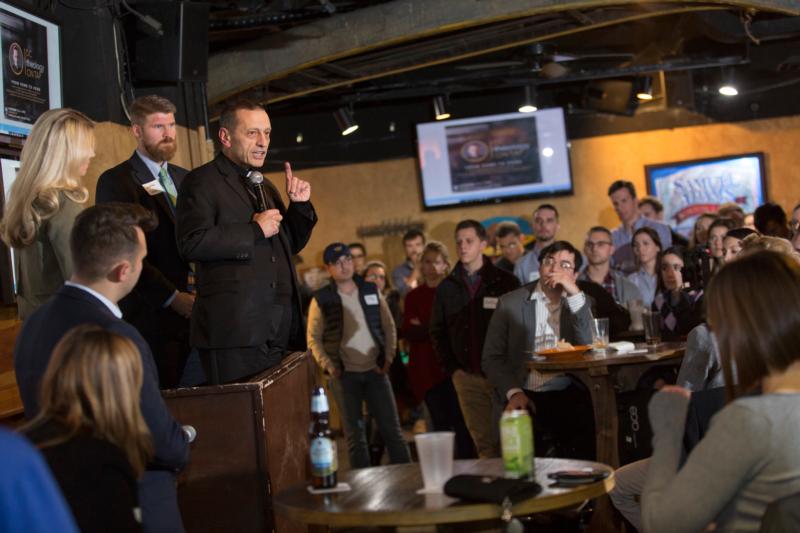
Bishop Frank J. Caggiano of Bridgeport, Conn., speaks Nov. 13 at Theology on Tap with Sarah Yaklic, director of Grotto Network out of the University of Notre Dame, and Jonathan Lewis, assistant secretary for pastoral ministry and social concerns in the Archdiocese of Washington. (CNS photo/Jaclyn Lippelmann, Catholic Standard)
BALTIMORE (CNS) — Near the close of the U.S. bishops’ Baltimore meeting, the church leaders turned their attention to the concerns of Catholic youths and young adults.
Bishop Frank J. Caggiano of Bridgeport, Connecticut, who was one of the delegates at the October Synod on Young People, the Faith and Vocational Discernment at the Vatican, spoke to the bishops Nov. 14 about his experience but also what needs to be done now at the diocesan and parish levels to continue the synod’s momentum.
He called the nearly monthlong event a “moment of great grace” that the church truly needed.
[hotblock]
And now, the challenge he said is for church leaders to sustain and further develop what began in Rome and what they heard from synod participants. For starters, dioceses could provide assemblies or synods and on a parish level, priests and other leaders should identify mentors for young people, bring youths into church leadership roles and help them to embrace their vocation.
“They do not seek to be given token involvement. They want to exercise genuine leadership in our church,” the bishop said, urging that this should happen at every level of church life.
He said a key theme from the synod was the ongoing need to protect the vulnerable. “We must protect our young people and ensure that our ministry for and with them are positive experiences of encounter between church leaders and the young.”
The synod also reflected a deep appreciation of the global nature of our church with different challenges and priorities faced by young people around the world and a recognition that many young people face violence and suffering. Also, he said, while some youths and young adults are active in their faith, “many are disaffiliating in growing numbers.” The bishop said the church should not only recognize the challenges these young people are facing but also “raise our voices in the public square on their behalf.”
[tower]
The previous night, Bishop Caggiano joined young adults who also had been at the synod for a Theology on Tap presentation in Washington to talk about the synod’s impact on the church.
The bishop told the audience about how the synod gave him an even deeper appreciation for Pope Francis, because of his humility and the difficult role he has of keeping the church’s global family together. He said the experience helped him to realize “how beautifully diverse the church is, how complicated the church is, and how much I sympathize and need to keep praying for that man.”
He told the group of young adults and the bishops about how the pope would arrive 20 minutes early for each session to meet anyone who wanted to meet him, posing for photos along the way.
He also told the Theology on Tap, sponsored by the Archdiocese of Washington’s Young Adult Ministry, that the church today can learn from the early church, which grew from 5,000 Christians in about A.D. 70 to about 23 million Christians in A.D. 312 A.D., during a time when Christianity was a crime, punishable by death.
What helped these early Christians grow in numbers was their personal pursuit of holiness and their supportive community, Bishop Caggiano said.
He said if the church as a whole were to commit to those ideals today, it would make a big difference.
“Not only will we see ourselves through the difficulties; not only will we see the vision of the synod,” he said, “but we will give rebirth to the whole church.”
***
Kelly Sankowski, reporter for the Catholic Standard, archdiocesan newspaper of Washington, contributed to this report.
PREVIOUS: University helps give former foster youth, homeless find a new beginning
NEXT: Bishops see much they can do despite no vote on steps to address abuse


Share this story